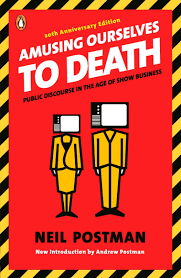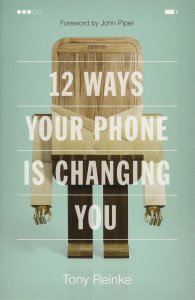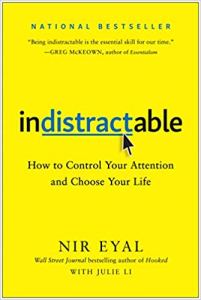The Top 10 Books on Technology (Guest Post)
I read about things that bother me, that I can’t quite figure out. When I was in college I read 20+ books on dating (I never quite figured it out)!
Over the last decade, one particular issue has plagued me and pushed me to read – why does the iPhone exert such a gravitational pull on me? And what is that doing to me/us spiritually?
These are the 10 Books on Technology that were the most helpful for me (in order of helpfulness).
1) The Next Story by Tim Challies
This book changed my life. When I read this in 2011 I was very addicted to this new technology called an iPhone.
The key to loosening its hold – trying to understand the “why.” What was I looking for in constantly checking my phone?
For me it was Informationism. Informationism is “a non-discerning vacuous faith in the collection and dissemination of information as a route to…personal happiness” (can any other Enneagram 5s relate??).
Major takeaways:
Distraction is the biggest threat to my walk with God. “Distraction is the enemy of deep thinking.” A distracted life is a shallow life.
I believe that more information is what I need. When in fact, “More information may lead to less wisdom.” I need to take in less information and seek more wisdom.
The two chapters on distraction and the flood of information are worth the price of the book.
You can read my full GoodReads review here.
2) Amusing Ourselves to Death by Neil Postman
Written in 1985, Amusing could not be more relevant to our modern world and humankind’s endless appetite for distraction. Postman has an incredible ability to make sense of vast amounts of history- to explain how (and why) we got to now, especially as it relates to technology.
Postman explains so much of our world- how technology affects our ability to think, and the resulting effects: anxiety and outrage (instead of reasoned discourse).
Postman puts into words what many of us feel – the glut of information causes anxiety, incoherence, and impotence. In the place of meaning, technology gives us amusement.

You can read my full GoodReads review here.
3) The Shallows: What the Internet Is Doing to Our Brains by Nicholas Carr
The Shallows is pretty dated (pre Instagram!) but, nonetheless, is packed with relevant wisdom and insight.
It’s worth the price of the book for Carr’s insights on how we learn: how our brains retain information and are reprogrammed, comparing it to filling a bathtub with a thimble.
“When we read a book, the information faucet provides a steady drip, which we can transfer, thimbleful by thimbleful, into long-term memory & forge the rich associations essential to the creation of schemas [complex, “thick” understanding].
Technology’s “frequent interruptions”, on the other hand, “scatter our thoughts, weaken our memory, and make us tense and anxious”.
You can read my full GoodReads review here.
4) iGen by Dr. Jean Twenge
Researcher and professor Dr. Jean Twenge has done extensive research on this generation of college students and found that there is just one activity that is significantly correlated with anxiety, loneliness, and depression: Screen Time (and girls are more affected by this than boys).
This book seems to be THE go-to book on GenZ that other books reference (it’s definitely my favorite that I’ve read re understanding this generation).
“There is a simple, free way to improve mental health: put down the phone, and do something else.”
5) Fahrenheit 451 by Ray Bradbury
In our distracted age, book readers almost possess superhuman ability- the ability to think deeply.
The classic dystopian book Fahrenheit 451 illustrates the devastating effects and societal breakdown caused by the rise of technology and decline of reading.
But it ends with a tiny glimmer of hope: a small band of apocalypse survivors, huddled around a fire quoting memorized books (including Bible passages!). They are the hope of the world.
Aside from Harry Potter, this is my favorite fiction book.
6) Disruptive Witness by Alan Noble
“To be a follower of Christ in the early twenty-first century requires a way of being in the world that resists being sucked into the numbing glare of [our phones].”
Alan Noble is the first I’ve seen to address both phones and secularism, applying Taylor’s A Secular Age to the digital age.
“distraction & secularism…perpetuate each other: we long for distraction in part because we are terrified of living in a meaningless world, & we struggle to discover a satisfying sense of fullness in the world because we’re constantly distracted”
You can read my full GoodReads review here.
7) The Tech-Wise Family by Andy Crouch
Practical tips:
This short little book is practical and profound.
-
- We wake up before our devices do, and they “go to bed” before we do.
- We aim for “no screens before double digits” at school and at home (no devices before age 10).
- Car time is conversation time.
- Spouses have one another’s passwords, and parents have total access to children’s devices.
8) 12 Ways Your Phone is Changing You by Tony Reinke
This is actually the first book I recommend to college students because it’s an easy read and applicable to a wide range of phone-addictions.
Wasn’t as helpful for me personally, but it seems to have the broadest appeal/application.
9) Indistractable by Nir Eyal
Nir Eyal wrote the book on how to make apps that suck up all your time. Literally, Eyal wrote the book used by Facebook, Twitter, Snapchat- Hooked: How to Build Habit-Forming Products.
Eyal wrote Indistractable to help us fight back against the distraction of our phones, a superpower Eyal calls the “the most important skill for the twenty-first century.”
For a secular book, Indistractable is surprisingly spiritual. Eyal spends the first 1/5th of the book digging into the question: “Why are we perpetually restless and unsatisfied?”
Our phones don’t distract us- we look to numb pain by looking at our phones. Ouch.
10) Competing Spectacles by Tony Reinke
A deep dive into how images effect us spiritually.
Some good insights on boredom and our zero-sum attention. “We are creatures shaped by what grabs our attention – and what we give our attention to becomes our… reality. We become like what we watch.”
 Guest Post by Tim Casteel
Guest Post by Tim CasteelTim has been on staff with Cru for twenty years and leads the Cru movement at the University of Arkansas. He and his wife, Mandy have five kids.
Tim loves discovering new ideas and sharing strategies that work. Tim is passionate about sharing ideas and resources for college ministry on his blog – TimCasteel.com
Tim is an avid fan of books, indie music, college football, and cookie dough.
Also follow Tim on Twitter (@TimCasteel), Workplace, or Facebook.

The Top 10 Books on Technology by Tim Casteel is licensed under a Creative Commons Attribution-NonCommercial-NoDerivatives 4.0 International License.Man with phone image by Gilles Lambert on Unsplash












